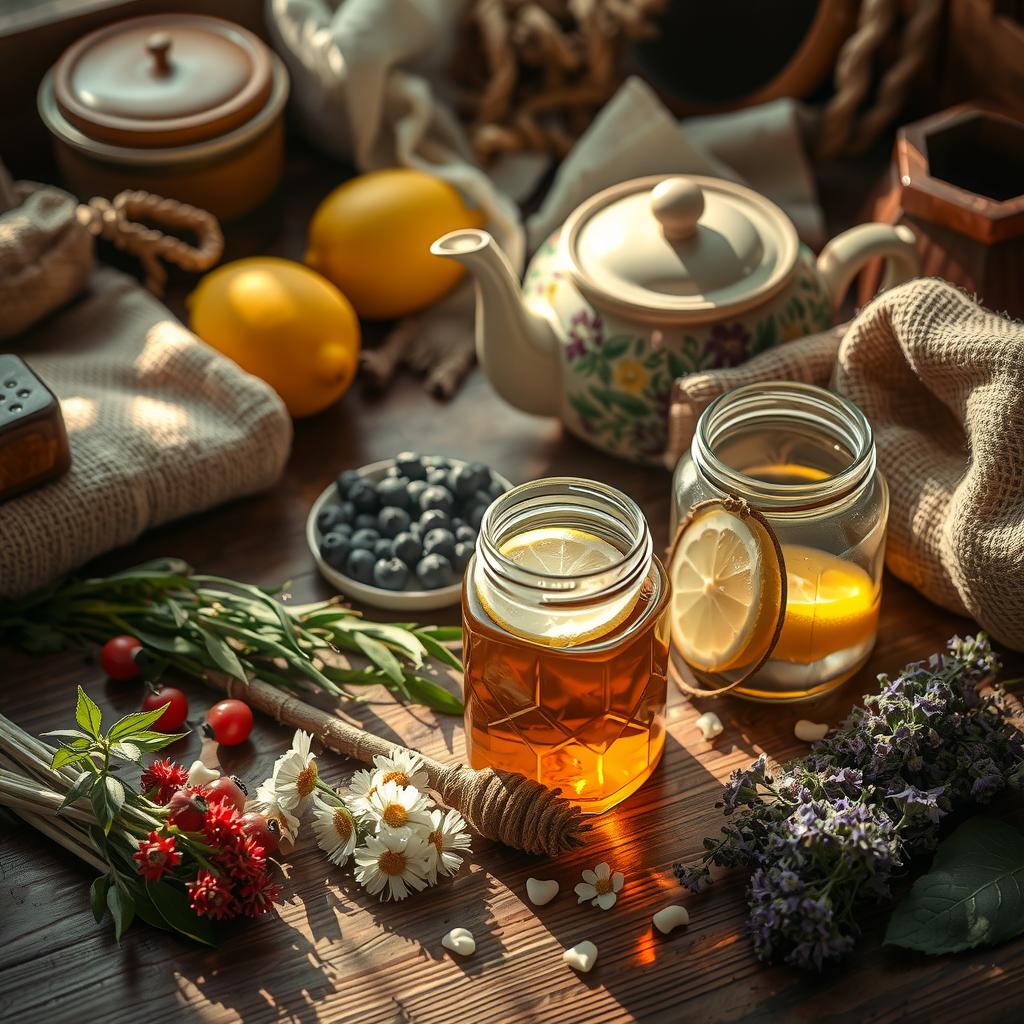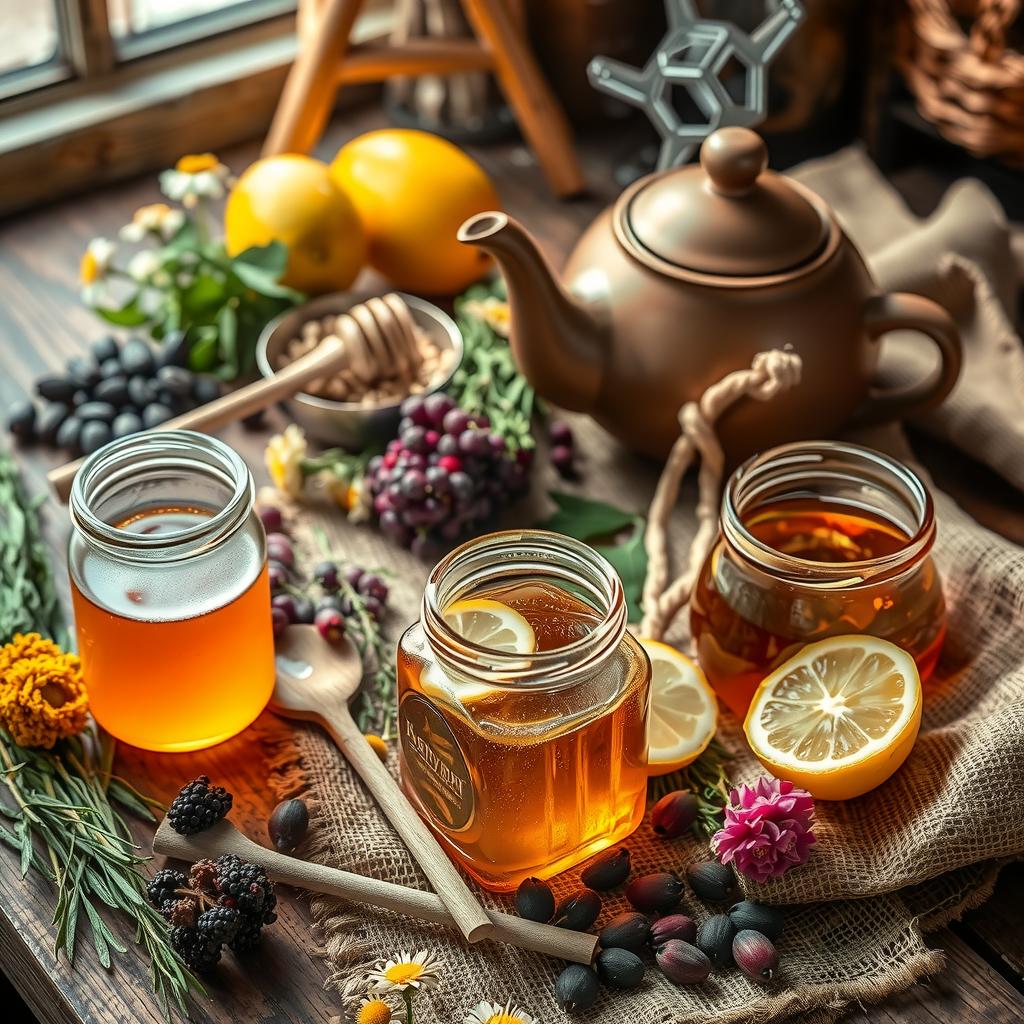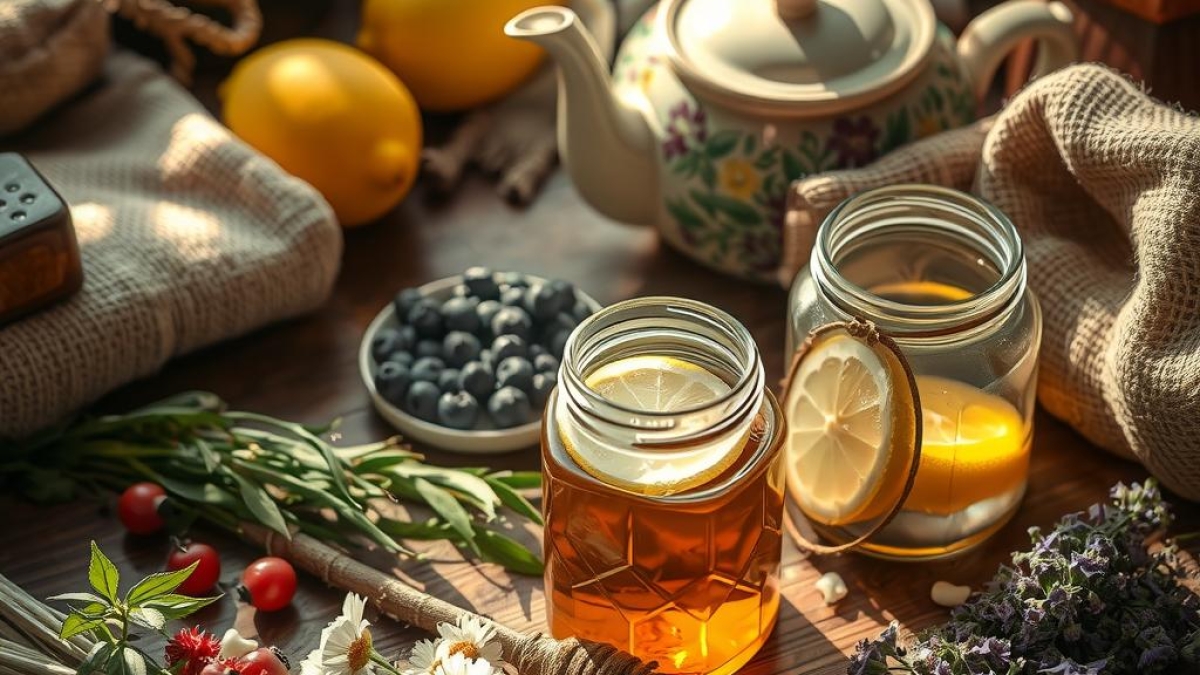As the chill of winter sets in, many individuals find themselves grappling with the all-too-familiar symptoms of the common cold. Coughing, sneezing, and a general sense of malaise can disrupt daily life, prompting people to seek effective remedies that go beyond conventional over-the-counter medications. In this quest for relief, an increasing number are turning to European folk remedies, which have stood the test of time and offer a trove of wisdom rooted in centuries-old traditions. These natural treatments not only provide cold symptoms relief but also emphasize holistic approaches that support overall health.
The allure of herbal medicine lies in its simplicity and accessibility; many remedies utilize ingredients that can be found right in one’s kitchen or garden. For instance, honey has long been lauded for its soothing properties when combined with lemon or ginger—both staples in traditional European households during cold season. This intersection between nature and healing offers a fascinating glimpse into how past generations approached illness without relying solely on modern pharmaceuticals.
By exploring these age-old practices, readers will discover various effective methods to bolster their immune systems through natural remedies. Each remedy is steeped in cultural significance and supported by anecdotal evidence from those who swear by their efficacy. From herbal teas infused with thyme or elderberry syrup to steam inhalation techniques using essential oils, these alternative therapies not only target immediate discomfort but also promote lasting wellness.
This article delves into 11 potent common cold treatments derived from European folk traditions that promise both comfort and nourishment during those dreary days spent battling colds. As readers navigate through these time-honored practices, they will gain insights into how integrating such approaches could enhance their self-care routines while fostering resilience against seasonal illnesses. Join us as we uncover these hidden gems within traditional medicine—a journey toward better health awaits!

Key Points:
-
Title of the key point: Traditional Herbal Teas for Cold Symptoms Relief
European folk remedies often include soothing herbal teas that have been cherished for their effectiveness. Infusions made from ingredients like thyme and elderberry not only provide warmth but also deliver essential vitamins and antioxidants, aiding in cold symptoms relief. These natural remedies are steeped in history, showcasing how traditional medicine can serve as a comforting ally during winter months. -
Title of the key point: Immune-Boosting Broths
Warming broths rich in garlic and ginger stand out as potent common cold treatments within European folk medicine. These ingredients are celebrated not just for their flavor but also for their ability to enhance immune support. The combination of spices creates a nurturing elixir that helps combat discomfort while promoting overall health, illustrating the role of herbal medicine in seasonal wellness practices. -
Title of the key point: Simple Kitchen Ingredients with Healing Properties
Many individuals may be surprised to learn that common kitchen staples can offer significant benefits when it comes to managing cold symptoms. Ingredients like honey, lemon, and various herbs found across Europe serve as effective components in alternative therapies aimed at providing relief from colds. This connection between everyday cooking and natural remedies reflects a holistic approach to health rooted deeply in traditional practices, encouraging individuals to harness these resources readily available at home for better well-being during colder seasons.

Introduction to the Common Cold
Recognizing Symptoms and Seasonal Health Impacts
The common cold is an illness that most individuals will experience at least once in their lifetime. Characterized by a range of symptoms, including nasal congestion, sore throat, cough, sneezing, and general fatigue, it often emerges as temperatures drop and seasonal changes take effect. This respiratory ailment typically results from viral infections; rhinoviruses are known culprits during colder months. The body’s immune response plays a vital role in how one experiences these symptoms; thus, understanding individual immunity can be crucial for effective management. As seasons transition from warm to chilly weather or vice versa, people may find themselves more susceptible to colds due to variations in temperature and humidity levels which affect mucosal defenses.
During autumn and winter months when colds peak, there is also an increase in indoor gatherings where viruses can easily spread among individuals. Changes in lifestyle habits such as decreased physical activity and diet shifts toward heavier meals during holidays may contribute further to weakened immune systems—leaving many seeking natural remedies or herbal medicine solutions for relief from cold symptoms. Traditional folk remedies have long been utilized across cultures for their perceived benefits; they include ingredients like honey for soothing throats or ginger tea thought to bolster immune support.
Additionally, the impact of seasonal changes on personal health extends beyond just vulnerability to common colds; emotional well-being can also fluctuate with changing light conditions affecting mood disorders such as Seasonal Affective Disorder (SAD). Therefore it becomes essential not only to address the immediate symptoms but also incorporate holistic approaches through alternative therapies that focus on overall wellness throughout fluctuating seasons.
Seasonal Variations: Their Role in Illness
How Weather Influences Immune Response
As the seasons shift particularly towards colder climates marked by lower temperatures and increased precipitation patterns lead inhabitants into enclosed spaces fostering virus transmission rates dramatically higher than during warmer months. Consequently observing how these environmental factors correlate with rising incidences of illnesses like the common cold reveals significant insights regarding public health strategies aimed at prevention rather than treatment alone.
Research indicates that exposure time outdoors diminishes substantially due both biological responses induced by lower sunlight exposure alongside behavioral adaptations prioritizing warmth over fresh air ventilation indoors—a perfect storm allowing pathogens greater opportunity thrive unchecked within communities lacking diligent hygiene practices especially prevalent around holiday gatherings when many share food items closely thereby increasing risk infection trails being passed amongst family members or friends alike unwittingly contributing those pervasive cycles sickness taking hold season after season.
Furthermore employing methods derived from traditional medicine principles enhances one’s capacity combatting outbreaks effectively while nurturing body resilience against future attacks via supportive actions integrating nutritional components rich antioxidants vitamins minerals geared enhancing immunity naturally without reliance solely pharmaceuticals which unfortunately often come side effects detracting overall quality life rather than improving it sustainably thus empowering readers recognize importance preventive measures taken prioritizing healthy living amidst inevitable fluctuations climate ensuring enduring vitality despite external pressures faced daily challenges posed changing environments experienced universally year-round wherever they might reside globally!
European Folk Remedies: Time-Honored Treatments for Cold Symptoms
Embracing Nature’s Wisdom for Wellness
In the realm of European folk remedies, time-honored treatments have long played a pivotal role in combating common ailments, particularly the unwelcome symptoms associated with the cold. Across various cultures, traditional medicine has relied heavily on nature’s bounty—herbs and plants transformed into soothing teas and warming broths that not only offer comfort but also bolster immune support. For instance, elderflower tea is revered in many regions as a natural remedy to alleviate nasal congestion and soothe sore throats. Its antipyretic properties are believed to help reduce fever while promoting perspiration—a process often encouraged during bouts of illness.
Similarly, chamomile tea serves as another cherished potion among herbal enthusiasts. Known for its anti-inflammatory effects, chamomile not only provides relief from cold symptoms but also aids in relaxation, allowing individuals to rest and recover efficiently. The gentle aroma of this herb can create a calming atmosphere that encourages better sleep—an essential component of healing.
Warming broths steeped with garlic and ginger have also gained recognition within traditional therapeutic practices throughout Europe. Garlic is celebrated for its potent antiviral properties; when combined with ginger’s ability to stimulate circulation and fight inflammation, these ingredients coalesce into an elixir that warms both body and spirit during chilly seasons when colds are rampant. Furthermore, adding root vegetables like carrots or parsnips enriches these broths with vitamins crucial for maintaining overall wellness.
Moreover, utilizing honey as a sweetener enhances these herbal concoctions while providing additional benefits such as cough suppression due to its soothing texture coating irritated throats. This age-old practice underscores how natural remedies can be effectively integrated into daily routines without reliance on pharmaceuticals—ensuring holistic care through diet alone.
As society becomes increasingly inclined toward alternative therapies amidst rising health concerns related to conventional medications’ side effects, awareness surrounding these common cold treatments continues to grow. Adopting such traditions offers individuals more control over their well-being while fostering connections across generations who value shared wisdom from folklore.
In conclusion, exploring traditional herbal medicine reveals an inviting tapestry woven from centuries-long practices aimed at alleviating suffering caused by colds—proving yet again that nature truly holds the key to enduring wellness through simple yet effective means tailored by culture itself.
The Natural Path to Enhanced Immunity
In a world where modern medicine often takes the spotlight, the wisdom of European folk remedies shines as a beacon of hope in promoting well-being and resilience. Historically, these natural treatments have been rooted in centuries-old traditions that prioritize harmony with nature. Embracing herbal medicine and other natural remedies can significantly enhance personal health by strengthening the body’s defenses against infections. For instance, common herbs such as echinacea and elderberry have long been celebrated for their ability to support immune function. Echinacea is known to reduce cold symptoms relief while elderberry has shown promise in combating influenza viruses. This shift towards integrating nature into health practices not only fosters physical immunity but also encourages mental wellness through mindful consumption of plant-based therapies.
The Role of Traditional Medicine
Traditional medicine plays an indispensable role in shaping our understanding of immunity today. Practices derived from ancient civilizations offer an alternative perspective on health care that emphasizes prevention over treatment. By examining methods employed by cultures worldwide, it becomes evident that many rely heavily on herbal medicine and adapted rituals aimed at boosting one’s immunity naturally. For example, ginger tea is frequently consumed during winter months across various cultures to stave off colds due to its anti-inflammatory properties—an effective way to tackle cold symptoms relief undeniably linked with traditional practices. Adopting aspects of traditional approaches can enrich contemporary medical protocols while providing individuals with tools for self-care that resonate deeply within their own cultural contexts.
Harnessing Nature’s Power Through Alternative Therapies
The exploration into alternative therapies highlights how embracing natural elements can cultivate resilience against future infections. Techniques such as aromatherapy using essential oils derived from plants like tea tree or oregano are gaining traction for their antimicrobial properties; they allow individuals not only to ease anxiety but also bolster immune response effectively when incorporated into daily routines. Additionally, dietary choices rich in antioxidants—from berries to leafy greens—serve as powerful allies for those seeking better immunity through nutrition alone. A holistic approach combining these alternatives creates a synergistic effect where each element enhances overall well-being—a philosophy steeped deeply within both European folk remedies and broader global perspectives on healing.
Mindfulness: A Complementary Approach
Integrating mindfulness into daily life acts as a potent complement to natural health practices aimed at improving one’s immune system functionality further still offers profound benefits beyond physical health concerns alone; it nurtures psychological equilibrium amidst the chaos prevalent today’s fast-paced existence brings about chronic stress which detriments bodily defenses considerably over time if left unaddressed! Regularly engaging in activities designed around relaxation techniques—from yoga sessions incorporating deep breathing exercises focusing solely upon being present moment—to guided meditations rooted firmly within nature settings allows participants’ minds & bodies connect harmoniously fostering resilience needed combat illness effectively whenever necessary arises without overwhelming sense urgency typically associated conventional healthcare systems instead nurturing proactive stance wellbeing!
Community Support: Building Resilience Together
Lastly, community support remains crucial when discussing sustainable approaches toward enhancing personal well-being via natural means! From local farmers’ markets offering organic produce brimming nutrients vital sustaining healthy diets encouraging conversations about shared experiences facing similar challenges navigating seasonal ailments provides valuable resources forming bonds strengthen ties among fellow residents who value holistic lifestyles prioritizing optimal living standards achievable through collaboration mutual respect! Engaging actively participating workshops focused educating attendees regarding practical applications utilizing traditional medicine, herbal solutions alongside innovative ideas gleaned throughout history reminds everyone interconnectedness foster uplifting environments promote healing ultimately leads towards improved quality life enjoyed all members society alike striving healthier futures together leveraging age-old wisdom blend seamlessly accessible advancements seen modern healthcare frameworks currently shaping landscape recovery journeys undertaken globally today!
As the chill of winter casts its spell, many individuals are left grappling with the frustrating symptoms of the common cold. In such times, a growing number of people are turning to European folk remedies that have stood the test of time. These remedies, rooted in centuries-old traditions, offer effective strategies for addressing cold symptoms while enhancing overall well-being through natural means.
One popular approach involves soothing teas made from herbs like thyme and elderberry. These herbal infusions not only provide warmth but also serve as potent common cold treatments with antiviral properties that can alleviate coughs and sore throats. Elderberry syrup has gained recognition for its ability to support immune function, making it a favored choice during winter months when colds tend to proliferate. Incorporating such herbal medicine into daily routines allows individuals to harness nature’s healing power while promoting long-term health.
Another traditional remedy worth exploring is warming broths rich in garlic and ginger. Both ingredients are celebrated for their anti-inflammatory and antimicrobial properties, providing effective relief from various cold symptoms. Garlic boosts circulation and supports immune response, while ginger aids digestion and soothes upset stomachs often associated with viral infections. By preparing these nourishing broths at home using simple kitchen staples, one can create a comforting meal that not only warms but also fortifies against future ailments—a perfect example of how alternative therapies can be seamlessly integrated into everyday life.
In addition to teas and broths, other natural remedies such as honey-infused lemon water or steam inhalation with eucalyptus oil further illustrate the wealth of knowledge found within traditional medicine practices across Europe. Honey acts as both a cough suppressant and throat soother due to its antimicrobial properties; meanwhile, inhaling steam infused with eucalyptus helps clear nasal congestion effectively—offering much-needed comfort during bouts of illness.
By embracing these age-old techniques derived from European folk traditions, individuals may find themselves better equipped to navigate the challenges posed by seasonal illnesses while fostering resilience against future infections through enhanced immune support. The connection between nature’s offerings and human health remains strong; thus understanding these holistic approaches not only enriches personal wellness journeys but also promotes sustainable healthcare practices in modern society.
FAQ:
Q: What are some common European folk remedies for cold symptoms?
A: Popular European folk remedies include soothing teas made from herbs like thyme and elderberry as well as warming broths enriched with garlic and ginger.
Q: How do herbal medicines help in treating colds?
A: Herbal medicines contain compounds that possess antiviral properties which aid in alleviating coughs,sore throats,and boost immune function—providing effective relief during cold seasons.
Q: Can I integrate traditional medicine into my daily routine?
A: Yes! Simple ingredients like honey-infused lemon water or garlic broth can easily be incorporated into meals or beverages for ongoing support against colds throughout colder months.

Add a Comment